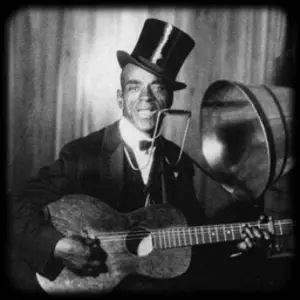DADDY STOVEPIPE
 Daddy Stovepipe is best known for being one of the first men to record a Blues song. His first record, where he sang and accompanied himself on guitar and harp, was not a hit when it was released in 1924, but it was a significant milestone in the history of the Blues.
Daddy Stovepipe is best known for being one of the first men to record a Blues song. His first record, where he sang and accompanied himself on guitar and harp, was not a hit when it was released in 1924, but it was a significant milestone in the history of the Blues.
Born in 1867 in Alabama, Johnny Watson was a well established entertainer with the renowned travelling tent show, The Rabbit’s Foot Minstrels in the years before WWI. He played 12-string guitar in a style that suggested he had at some time played in a Mexican mariachi band and he sang with a strong, penetrating voice.
Daddy also recorded with his wife ‘Mississippi Sarah’, who had a great voice and would honk along blowing a jug. As well as exploiting the late 20s jug-band-craze, their easy banter on their records enhanced the good-time music. After 1931, when record sales plummeted due to the recession the ‘Stovepipes’ did not record for some years. A 1935 session for Bluebird Records did not revive their fortunes and they ‘retired’ to Greenville MS.
‘The Spasm’ by Daddy Stovepipe and Mississippi Sarah;
